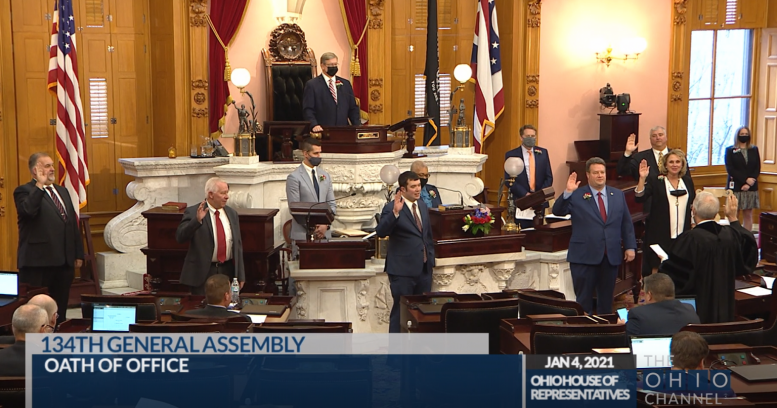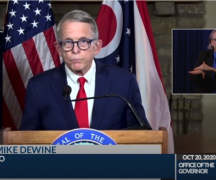The office of Ohio House Speaker Bob Cupp has sought a resolution be drafted to expel a member of the state legislature.
Though the request does not identify the member in question, this may mark the first step taken to remove from office Rep. Larry Householder, R-Glenford, the former House speaker who was arrested last year on corruption charges for his alleged involvement in the nuclear bailout bill scandal.
Sheila Willamowski Boehner, the deputy chief of staff and executive counsel for Speaker Cupp, sent an internal request to the Legislative Service Commission asking for two resolutions to be drafted. The request, made Thursday and obtained by the OCJ, asks for a floor resolution to expel a member and a separate floor resolution to “create a committee to investigate.” Both are asked to be drafted within the next week.
Taylor Jach, a spokesperson for the speaker, did not immediately respond Friday to a request for clarification of whether these resolutions involve Householder. OCJ also asked for information on what committee work would be necessary to carry out an expulsion and if a timetable is in place for this effort.

Amber Epling, the communications director for the Minority Caucus, said House Democrats are not aware of this resolution effort and have not been contacted by Cupp’s office about expelling a member.
Householder, along with four political operatives, were arrested last July on racketeering charges in what was described by U.S. Attorney David DeVillers as being “likely the largest bribery and money-laundering scheme ever in the state of Ohio.”
They were alleged to have been involved in a scheme to funnel millions of dollars in “dark money” to help get a $1.3 billion nuclear bailout passed and signed into law.
Two of the operatives have since pleaded guilty. Householder and two other lobbyists arrested have pleaded not guilty. OCJ has left messages requesting comment with two attorneys representing Householder regarding Thursday’s resolution request.
In the aftermath of his arrest, Householder resisted widespread calls from political officials in both parties to resign. Those who called on Householder to resign included Cupp, then-Senate President Larry Obhof, Gov. Mike DeWine, Ohio Republican Party Chair Jane Timken and a vast number of other legislative and statewide officials.
A week after Householder’s arrest, the Ohio House voted unanimously to remove the Perry County Republican as speaker. Cupp was voted to replace him.
A subsequent motion to remove Householder from the chamber failed, mostly along party lines: All Democrats and three Republicans voted to hear the motion, and the rest of the Republican caucus voted against.
Cupp told reporters that day the House would hold off from seeking Householder’s removal from office for the rest of the year. Cupp, a former Supreme Court justice, noted this language in the Ohio Constitution: “Each House may punish its members for disorderly conduct and, with the concurrence of two-thirds of the members elected thereto, expel a member, but not the second time for the same cause.”

At the time, Householder was running unopposed for another term in office. Several write-in candidates later filed to campaign against him, but Householder was reelected handedly in the November election.
The scenario outlined by Cupp involved Householder getting removed; winning reelection; then returning this month for his new term. With a member only being able to be removed once for the same cause, this would leave Householder free to serve in the 134th General Assembly.
That is, so long as he is not convicted. Ohio law prohibits a person convicted of a felony from serving in public office, meaning Householder would be removed automatically should he be found guilty in court.
In the last term, House Democrats tried another way to remove Householder from office. Reps. Jeffrey Crossman of Parma and Gil Blair of Weathersfield sponsored legislation to prohibit any politician charged with a public corruption offense from taking office. This would have prevented Householder from being sworn-in despite his case still being pending. The bill did not receive a committee hearing.
Monday, Jan. 4 marked the first day of the 134th General Assembly and Householder was sworn-in for another two-year term. Cupp was asked about the effort to remove Householder.
“We have 20 new members of the legislature. We have not discussed it yet. We will be discussing it, and we will go from there,” Cupp said, according to The Columbus Dispatch.
Three days later came the request from his office for a floor resolution to expel a member.
***
State to send vaccination criteria to schools, teachers union has concerns about rollout
Gov. Mike DeWine explained more of the planned roll-out of COVID-19 vaccinations for schools on Thursday, and a state teachers union said the criteria involved has members concerned.
DeWine said the plan as of now is to start vaccinating school personnel in the first week of February, with a goal for schools who receive vaccinations to return to in-person instruction by March 1.
“The sole rationale of vaccinating teachers and others in schools is to open up schools,” DeWine said on Thursday.
To achieve that, a condition of receiving the vaccinations is that superintendents agree to in-person or at least hybrid learning by that date. Forms will be sent to district superintendents this week asking them to agree to that condition.
It is this pre-requisite that the Ohio Federation of Teachers called concerning in a press conference on Thursday morning.
“It is not appropriate to make that a pre-condition of receiving the vaccine,” said OFT executive director Melissa Cropper. “It will slow down the vaccine’s distribution in communities that are hit hardest by the pandemic, and will further bifurcate the academic progress of students across Ohio.” READ MORE





